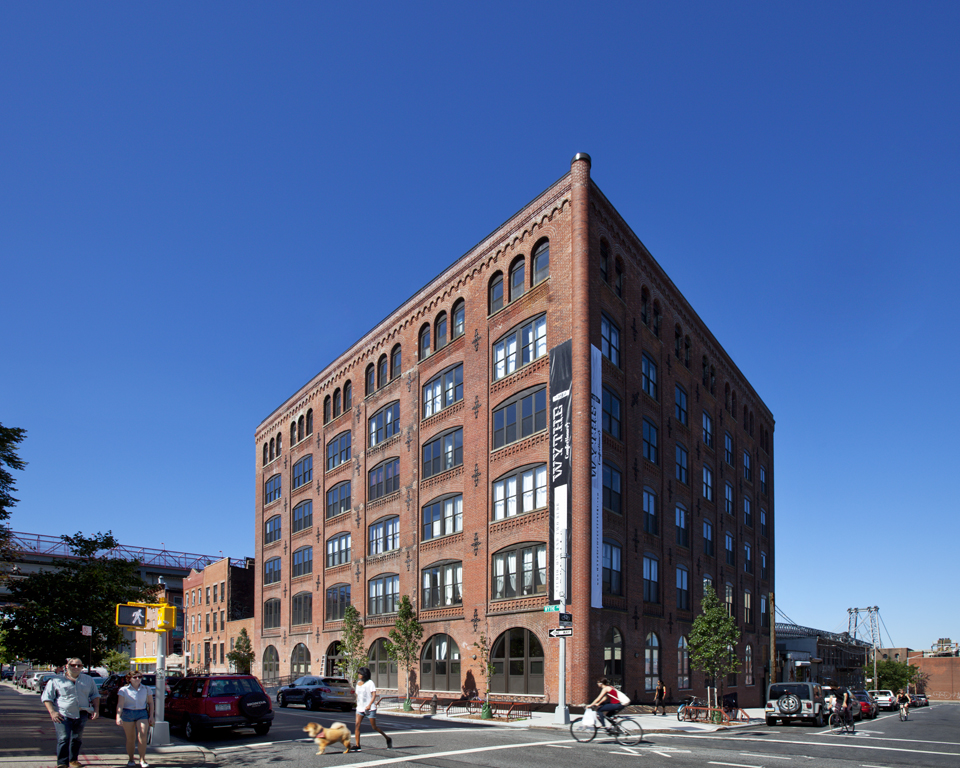The New York office Perkins Eastman joins developer/builder Caro Enterprises in celebrating the completion of the unique 69-unit Wythe Confectionery apartments at 390 Wythe Avenue in Williamsburg, Brooklyn. The conversion has restored the building’s original beauty, with plentiful exposed brick, original wooden beams, and wooden ceilings.
Principal in Charge Shawn Basler AIA says of the building’s transformation, “It has been very gratifying to be part of the effort to retain the architectural heritage in such a vibrant and diverse neighborhood.”
Originally built to house the Matchett Candy factory at the turn of the 19th century, the pine framed brick building was one of the few candy factories in Williamsburg. The building is a testament to the area’s flourishing industrial past, and as a physical example of the commitment to the preservation of the neighborhood character and our vital connections to its heritage. As a piece of Brooklyn history, Perkins Eastman and the developer went to great lengths to preserve and restore original architectural features, while reclaiming and reusing materials when possible in the studio, one- and two-bedroom loft apartments.
The team retained architectural features like the brick barrel-hinge corner, a corbelled brick cornice, arched windows, massively scaled ground floor openings, and decorative brickwork punctuated with unique decorative iron ties across the facade. Brick and timber columns have once again been exposed and highlighted, cast iron column straps and capitals have been brought back to life, and the original heavy-timbered plank flooring was restored and retained as ceilings--all combined with modern fixtures and finishes throughout. Other native materials, including extra timbers and slate flooring that were not used during the restoration, were reclaimed for reuse in the public and shared spaces of the building, designed by Visconti Architecture.
Related Stories
| May 16, 2011
Dassault Systèmes to distribute Gehry Technologies’ digital project
Dassault Systèmes and Gehry Technologies announced that Gehry Technologies’ Digital Project products will be integrated into the Dassault Systèmes’ portfolio and distributed through Dassault Systèmes. Digital Project is a suite of 3D BIM applications created by Gehry Technologies using Dassault Systèmes’ CATIA as a core modeling engine.
| May 11, 2011
DOE releases guide for 50% more energy-efficient office buildings
The U.S. Department of Energy today announced the release of the first in a new series of Advanced Energy Design Guides to aid in the design of highly energy efficient office buildings. The 50% AEDG series will provide a practical approach to commercial buildings designed to achieve 50% energy savings compared to the commercial building energy code used in many areas of the country.
| May 10, 2011
Google hires Ingenhoven Architects to design new Mountain View office
The current Googleplex is straining at the seams and yet the company is preparing its biggest hiring surge ever, so Google decided now’s the time to build its own office space—a first for the Internet giant. The company hired Ingenhoven Architects, a German firm that specializes in sustainable architecture, to create plans for what could be a 600,000-sf office.
| May 10, 2011
Solar installations on multifamily rooftops aid social change
The Los Angeles Business Council's study on the feasibility of installing solar panels on the city’s multifamily buildings shows there's tremendous rooftop capacity, and that a significant portion of that rooftop capacity comes from buildings in economically depressed neighborhoods. Solar installations could therefore be used to create jobs, lower utility costs, and improve conditions for residents in these neighborhood.
| May 10, 2011
Dinner is now served…atop the Lincoln Memorial?
Take a look at the temporary restaurant sitting atop Brussels’ historic Arc de Triomphe-Triomfboog. The Cube, by Electrolux, offers 18 diners a spectacular view of the Parc du Cinquantenair, and is one of two structures traveling across Europe, making stops at famous landmarks in Belgium, Italy, Switzerland, Sweden, and Russia. What do you think about one of these 60-tonne structures being placed on a U.S. memorial?
| May 6, 2011
Ellerbe Becket now operating as AECOM
*/ The architecture, interiors and engineering firm Ellerbe Becket, which joined AECOM in 2009, has fully transitioned to operating as AECOM as of May 2, 2011.
| May 2, 2011
URS acquires Apptis Holdings, a federal IT service provider
SAN FRANCISCO, CA and CHANTILLY, VA– April 28, 2011 – URS Corporation and Apptis Holdings, Inc., a leading provider of information technology and communications services to the federal government, announced that they have signed a definitive agreement under which URS will acquire Apptis.
| May 2, 2011
Perkins+Will merges with Vermeulen Hind Architects, offically launches Perkins+Will Canada
Ottawa and Hamilton-based Vermeulen Hind Architects, one of Canada’s leading healthcare architectural firms, has merged with Perkins+Will. Vermeulen Hind joins Toronto-based Shore Tilbe Perkins+Will and Vancouver-based Busby Perkins+Will to create Perkins+Will Canada. The combination marks the official launch of Perkins+Will Canada, a merge that will establish the firm as among the pre-eminent interdisciplinary design practices in Canada.
| Apr 26, 2011
Ed Mazria on how NYC can achieve carbon neutrality in buildings by 2030
The New York Chapter of the American Institute of Architects invited Mr. Mazria to present a keynote lecture to launch its 2030 training program. In advance of that lecture, Jacob Slevin, co-founder of DesignerPages.com and a contributor to The Huffington Post, interviewed Mazria about creating a sustainable vision for the future and how New York City's architects and designers can rise to the occasion.










